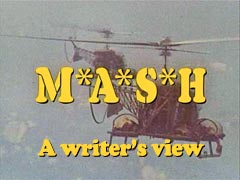M*A*S*H: A writer’s view. #4 in the series.
Until the middle of the 1970s, conventional wisdom had it that a half-hour situation comedy had room for only one plot per episode. Subplots, if any, were kept down to the level of a running gag. Fitting a good story (and some laughs) into 25 minutes of film was hard enough; to tell two was thought to be impossible. M*A*S*H was one of the first sitcoms to break that rule and introduce multiple story lines per episode: so successfully, in fact, that the technique became a mainstay of the show’s formula in later years. Nearly every episode from the fourth season on has clearly identifiable ‘A’ and ‘B’ stories.
In those later years, when the original writers had been replaced by lesser talents, the ‘A’ story was usually straight drama. This afforded the actors opportunities for Serious Dramatics and tub-thumping on their favourite causes célèbres, whilst making the writers’ jobs easier. Comedy is much more difficult to write than drama; it is harder to act, too – though far less gratifying for the performer’s ego, since Oscars and Emmys and the like are generally awarded by humourless clods. (Charlie Chaplin never won an Academy Award as an actor; he got his sole Oscar as a composer, for the score to Limelight. Before he died, the Academy gave him an honorary award for lifetime achievement as an actor: the feeling was that if they let Chaplin die without winning an Oscar for his acting, the Oscars themselves would be devalued. Chaplin did not win an Oscar so much as the Academy won a Chaplin.)
In the first year and a half of M*A*S*H, there were several ‘odds and ends’ episodes, consisting mostly of comic sketches strung together without much pretence of a plot. Usually, the unifying device was a character’s letter home, as in the ‘Dear Dad’ episodes. ‘Showtime’, the final episode of the first season, lacked even that. Commissioned at the last moment, when CBS demanded one more episode than Reynolds and Gelbart thought they were under contract for, it features a USO performance at the camp, intercut with brief comical interludes. This was not where the future of the series lay.
That future began with an episode called ‘Deal Me Out’, in which, for the first time, the writers worked multiple plot lines together into a unified story. The structure is complex and ambitious, and in lesser hands, could easily have turned into an unfocused mess. Fortunately, the writers were Larry Gelbart and Laurence Marks, and the script is a landmark, not only in the history of M*A*S*H, but in sitcom history as a whole. [Read more…]








Recent Comments